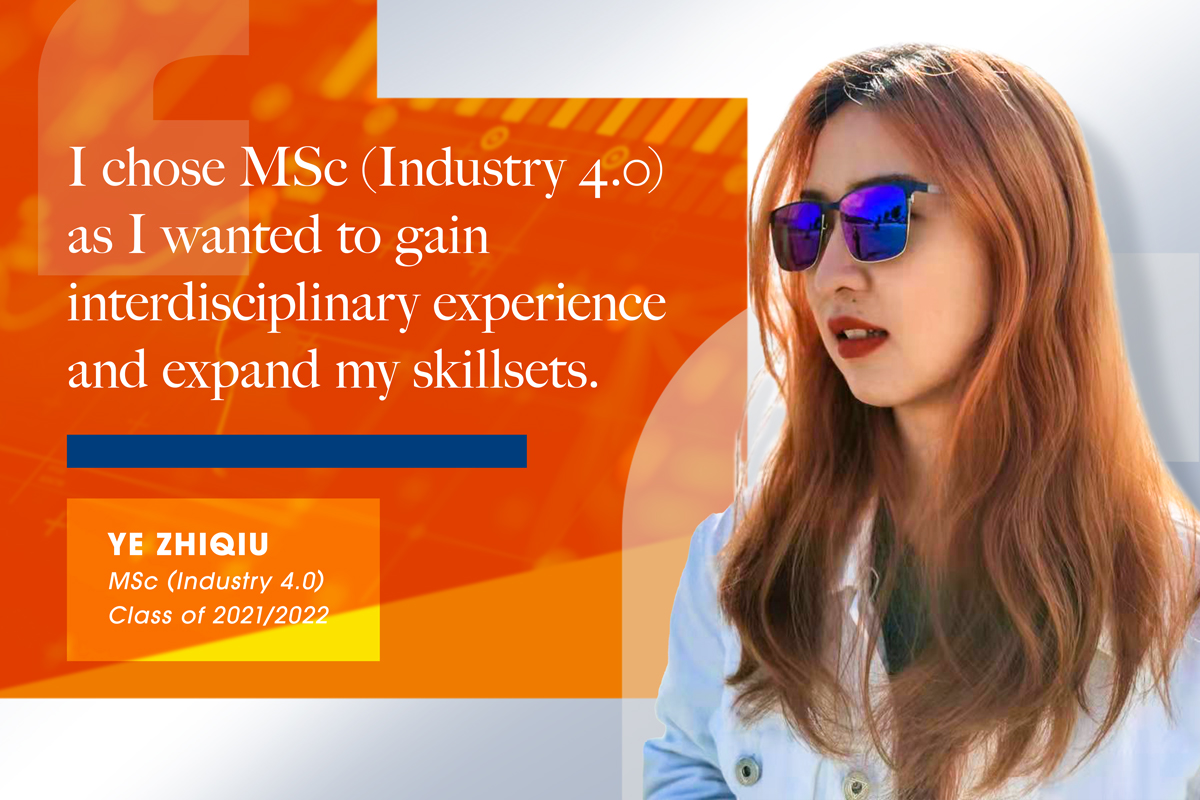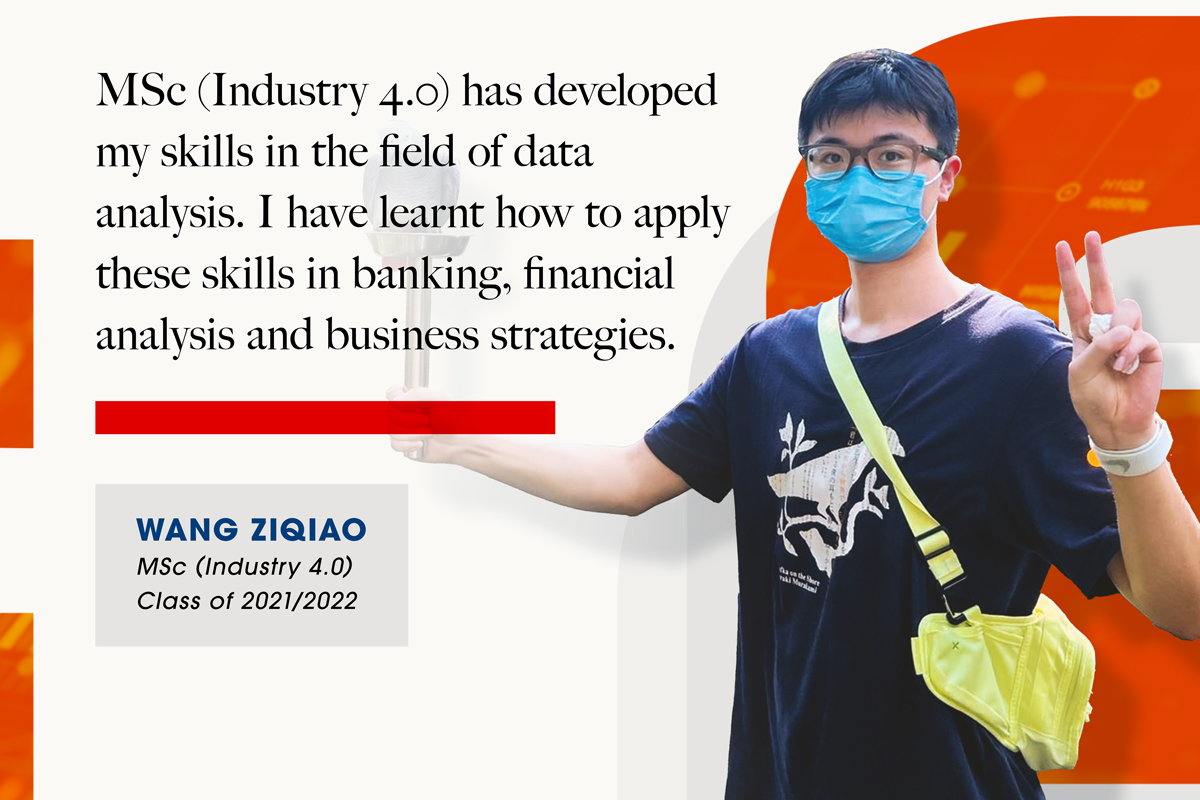After graduating with qualifications in the Science, Technology, Engineering and Mathematics (STEM) arena, Wang Ziqiao and Ye Zhiqiu could have had their pick of job opportunities.
However, the duo, who both hail from China, decided not to join the workforce. They saw how globalisation and technological disruption were affecting industries and job roles. Change was on the horizon; Ziqiao and Zhiqiu felt that they needed to be able to access opportunities beyond what their Bachelor’s Degrees in Environmental Science and Engineering respectively had prepared them for. They needed something more than classroom knowledge so that they could stand out from other fresh graduates. They needed a graduate qualification that would help them become in-demand, future-ready talents.

The Right Fit for Future-Proofing
The Master of Science (Industry 4.0), also known as MSc (Industry 4.0), from the National University of Singapore (NUS) was the exact fit for their needs. The programme offered both the depth and breadth that Ziqiao and Zhiqiu were looking for.
Its curriculum emphasised the development of technical skills, while also allowing students to choose to specialise across a wide variety of fields (including computing, digital business, systems software development and manufacturing) through more than ten Graduate Certificates.
The multidisciplinary nature of the programme was also a draw (since it involves a collaboration among five different academic units at NUS: Faculty of Science, School of Computing, NUS Business School, NUS Institute of Systems Science, and NUS College of Design and Engineering).
On top of that, NUS enjoys a stellar academic reputation, with 16 academic programmes placed in the top ten globally in the Quacquarelli Symonds (QS) World University Rankings by Subject 2022.
Won over by the curriculum structure and the quality of education offered by NUS, they applied for the MSc (Industry 4.0) programme and arrived in Singapore to commence their studies.
A Sound Education
Once they became immersed in the MSc (Industry 4.0) programme, Ziqiao and Zhiqiu found themselves learning about a range of topics, including data analytics. Incidentally, the module Data Analytics for Sense-making (IND5003) is one of Ziqiao’s favourites. It covered applications in multiple domains, from consumers to human resources to retail, allowing him a first-hand experience in studying data in various environments. Through his classes, he picked up tools and techniques for performing supervised and unsupervised learning of structured and unstructured data.
Zhiqiu, on the other hand, found the course Foundations of Machine Learning (DSA5102) to be her most memorable. The course introduced to her the fundamentals of machine learning, and she had the chance to delve into how these systems work. She was also fond of the Strategic Procurement in a Digital World (IND5024) module. Although not part of her Graduate Certificate coursework, it allowed her a deeper insight to how companies have different strategies with regards to procurement and their roadmaps for digital transformation.

A Surprise Scholarship
Throughout their first semester, the two hardworking students stayed firmly focused on their studies. They were hungry for the knowledge and aimed for this to be reflected in their grades. Their dedication did not go unnoticed, and the two soon received word that they had been selected to receive Dell Technologies Master of Science (Industry 4.0) Scholarships.
To be eligible for the scholarships, established in 2020 by Dell Technologies, students in the MSc (Industry 4.0) programme would have had to complete at least 18 units within Semester 1 and be counted among the top five percent of the cohort, which is no mean feat.
Ziqiao was pleasantly surprised to receive the scholarship, while Zhiqiu saw it as an affirmation of the hard work that she had put into the programme. The recognition encouraged her to continue working hard and keep improving.
Looking to the Future
Ziqiao and Zhiqiu are both looking ahead to make the most of their career opportunities after they graduate. Ziqiao is interested in data science and analysis roles in the financial or technology industries, while Zhiqiu will be returning to China to start a full-time position in Huawei. Based in Shenzhen, the role involves developing machine learning, which is in line with her Graduate Certificate.
Armed with their Master’s Degrees, they are looking forward to developing their experience in their fields with the multidisciplinary mastery they have gained from the MSc (Industry 4.0) programme.
Master of Science in Industry 4.0 Programme
Prepare for the emerging workplace of the fourth industrial revolution with the MSc (Industry 4.0) programme from NUS—a multi-disciplinary programme designed in accordance with the Singapore Economic Development Board Singapore Smart Industry Readiness Index.
Learn how to enhance productivity in the workplace and make use of cutting-edge technologies and tools such as artificial intelligence, virtual reality, and additive manufacturing to keep up with the changes in various industries.
Applications for the 2023/2024 intake are open till 31 Jan 2023 for international students and 28 February 2023 for local students.
For more information on the programme and application matters, click here.